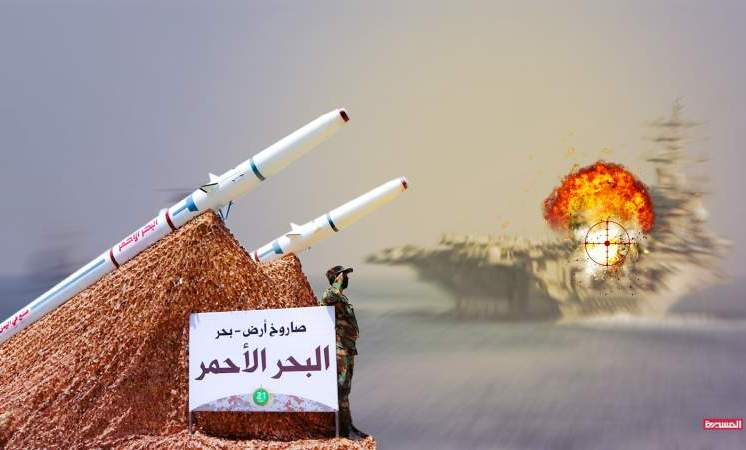The Yemeni armed forces have escalated their military operations against enemies in the Red Sea, the Arabian Sea, and the Gulf of Aden. This move is a reaffirmation of the official and popular stance in support of Gaza and their oppressed people.
The Yemeni naval forces and the drone air force have executed two distinct military operations. The first targeted the American ship “PROPEL FORTUNE” in the Gulf of Aden with several suitable naval missiles. The second operation targeted a number of American warships in the Red Sea and the Gulf of Aden, using thirty-seven drones. Both operations successfully achieved their objectives.
Commenting on these operations, Yemeni military expert and analyst Brigadier General Abed Al-Thawr stated that “the confrontations have entered a new, unprecedented phase in the history of American wars.” He confirmed that “the Yemeni armed forces have adopted a large-scale offensive strategy to crush the American forces.”
Brigadier General Al-Thawr, in an intervention via the “Al-Masirah” channel, said that “the American forces have begun to understand the message well, and they are now in a big predicament; because the Yemeni military capabilities have exceeded theirs.” He explained that “American, British, and Israeli warships in the Red Sea and the Arabian Sea are surprised by the most cunning Yemeni weapons, and the enemies are incapable of confrontation today.”
These two operations are not a prelude to the surprises announced by the leader Sayyid Abdul Malik Badr Al-Din Al-Houthi - may Allah protect him - but they are a new phase, a transition from one situation to another. Perhaps the enemy understands the message well and leaves the square of arrogance and power waving to acknowledge defeat and non-confrontation.
Brigadier General Al-Thawr points out that “the strategy of the Yemeni armed forces now is a comprehensive attack in the seas, which gives the Yemeni forces the advantage of striking any American or British target, including war destroyers. This is a qualitative leap in the management of the battle, and the transition to the strategy of the comprehensive battle will lead to the exhaustion of the enemy’s capabilities, and the loss of control.”
The military expert Brigadier General Al-Thawr draws attention to the fact that “Yemen has reached the stage of deep defense; in the sense that the Yemeni armed forces have the ability to undermine the American enemy’s capabilities wherever they are and in any area they spread.” He confirmed that “targeting American destroyers with (37) drones gives an indication that Yemen now controls the battlefield and the theater of operations, and that any adventure by the barges to advance may expose them to sinking.”
Military Manufacturing Overcoming Challenges:
On his part, military analyst Brigadier Abed Al-Sharqi confirms that “the success of the Yemeni military operations in carrying out two operations against the American barges and ships is an indication of the qualitative development of the Yemeni armed forces, which work tirelessly to upgrade war manufacturing to face current challenges.”
Al-Sharqi explains in a special statement to “Al-Masirah” that “the continuation of military operations against the Zionist entity and its allies sends a message to the enemies that military operations cannot be stopped except by stopping the aggression and lifting the siege on Gaza,” pointing out that “the wise leadership of Yemen has qualified it to stand honorable and historical in support of Gaza, which is exposed to the ugliest brutal crimes in the midst of a complete international and Arab silence.”
Al-Sharqi emphasizes that “the Yemeni military capabilities evolve with the evolution of events, developments, and challenges,” explaining that “our confrontation with the coalition of aggression over eight years has contributed to the upgrading of military capabilities, and forced the forces of the coalition of aggression to stop, and return to negotiations and truces.”
He indicates that “American officials admitted in Western and Hebrew media that the coalition of Americans and Britons in the Red Sea did not contribute to undermining the combat capabilities of the Yemeni armed forces,” indicating that “the American coalition is fighting a very difficult battle in the Red Sea that only happened in World War II.”
Qualitative Operations:
For his part, military analyst Zaid Al-Sharif explains that “the American-British aggression pays the price of its folly through many losses; as a result of the strong Yemeni missile and air strikes, which are escalating more and more with the passage of days and the length of the duration of the battle.”
Al-Sharif says: “It is widely noticed for the military operations carried out by the Yemeni armed forces in the Yemeni waters targeting the Zionist ships and the American ships and destroyers and the British ships that the number of those successive operations and their strength and impact and their continuity and escalation as if the Yemeni armed forces are the first and last concerned with the confrontation in resisting the Zionist aggression on Gaza.”
Al-Sharif adds, “It seems as if the battle in Gaza is a battle of the Yemeni army alone and not a battle of the entire nation, led by the Palestinian people and their resistance.”
In addition, Al-Sharif regards the execution of military operations as a significant honor for Yemen and its resilient people. This sentiment is fueled by the armed forces’ unwavering commitment to supporting Palestine.
Al-Sharif underscores the distinctiveness of the Yemeni military operations against the Zionist entity and its allies, stating that they are unparalleled globally. He affirms that these operations have garnered global attention due to their profound impact, scope, persistence and escalating intensity.
Al-Sharif highlights the relentless pace of the Yemeni armed forces’ operations, with hardly a week passing without a significant number of strategic operations targeting American, Zionist, and British ships and destroyers. He notes that the fate of these American, British, and Zionist vessels is sealed - they are either destined to burn, sink, or retreat.







